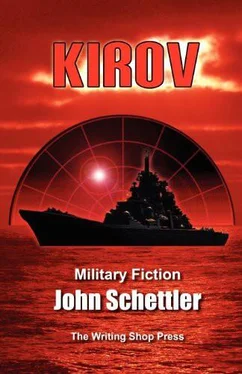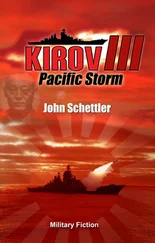John Schettler - Kirov
Здесь есть возможность читать онлайн «John Schettler - Kirov» весь текст электронной книги совершенно бесплатно (целиком полную версию без сокращений). В некоторых случаях можно слушать аудио, скачать через торрент в формате fb2 и присутствует краткое содержание. Жанр: Фантастика и фэнтези, Альтернативная история, на английском языке. Описание произведения, (предисловие) а так же отзывы посетителей доступны на портале библиотеки ЛибКат.
- Название:Kirov
- Автор:
- Жанр:
- Год:неизвестен
- ISBN:нет данных
- Рейтинг книги:5 / 5. Голосов: 1
-
Избранное:Добавить в избранное
- Отзывы:
-
Ваша оценка:
- 100
- 1
- 2
- 3
- 4
- 5
Kirov: краткое содержание, описание и аннотация
Предлагаем к чтению аннотацию, описание, краткое содержание или предисловие (зависит от того, что написал сам автор книги «Kirov»). Если вы не нашли необходимую информацию о книге — напишите в комментариях, мы постараемся отыскать её.
Kirov — читать онлайн бесплатно полную книгу (весь текст) целиком
Ниже представлен текст книги, разбитый по страницам. Система сохранения места последней прочитанной страницы, позволяет с удобством читать онлайн бесплатно книгу «Kirov», без необходимости каждый раз заново искать на чём Вы остановились. Поставьте закладку, и сможете в любой момент перейти на страницу, на которой закончили чтение.
Интервал:
Закладка:
Like most men who had risen to captain one of Britain’s capital ships, Tennant had joined the navy as a young lad of 15 years in 1905. Beginning as a navigator, he had a ship shot from under him and sunk at Jutland in 1916, then joined HMS Renown, the sister ship of Repulse, when King Edward had toured the world on her in the 1920s. He made Captain quickly, and in this war he had skillfully masterminded the British evacuation at Dunkirk, earning the nickname “Dunkirk Joe.” Yet he had seen quite enough of sinking ships and stubborn retreats. Once he was seated aboard Repulse, he had put her to good use, chasing down and engaging the “Twins,” battlecruisers Scharnhorst and Gneisenau in the Norwegian campaigns, and driving them off. The loss of Hood galled him, and he was eager for a chance to even the score.
“It’s a man’s game now,” he said to his Executive Officer. “Convoys are all routed south with the Prime Minister at sea. That means it’s all run and gun up here for the warships. I’ve been wanting to get into a scrap ever since Hood went down, god bless her. They wouldn’t let me try and sink my teeth into Bismarck after that, but this new contact is rumored to be a cruiser, or perhaps a fast carrier.”
“ Graf Zeppelin, sir?”
“Daddy Brind seems to think as much.”
“Our 15 inch guns will deal with that easily enough, sir.”
“That they will. The question is finding the damn thing out here. The weather is gray, though this front looks to be passing and we might get better seas in time. Let’s see if we can make 32 knots. We’ve only just come within a nip of that before. Let’s push her all out and find this enemy ship.”
“Right, sir, but I wish we had better eyes. They’re still working up that radar equipment.”
The ship had only just completed another minor refit, getting fifteen more 20mm Oerlikon AA guns and a type 284 surface gunnery radar set that the technicians had still been working on when Home Fleet sailed. They were kept aboard, stringing up the wiring and testing the antennas, but could get nothing more than a wash of noisy static when they tried out the new equipment. Repulse was also carrying six sets of the Type 286 Surface to Air radar, earmarked for ships in the Indian Ocean. She was slated for transfer that way with Prince of Wales after this official business had concluded, and eventual deployment to the Pacific as a deterrent against possible Japanese attack there.
Some 100 miles to the west, there was nothing wrong with the radar sets aboard Kirov, and other eyes were watching the approach of both Repulse and King George V very closely. Admiral Volsky was on the bridge near the end of his watch, a sullen mood on him with the return of that bothersome headache that had been plaguing him for days now. He was tired, feeling the stress of the last few days and still making the interior adjustment to the bewildering fate of his ship and crew. He thought he might go and see the doctor, leaving Orlov on the bridge for the last hour of his watch before Karpov returned at 08:00 hours.
The brief night had slipped by uneventfully, and the ship was now a little over 200 miles due west of Reykjavik. Though the British force that had been shadowing them continued to follow, they remained at a respectful distance and Rodenko saw no further signs of hostile activity. Apparently Karpov had given them quite a beating in that second air raid, and they were now licking their wounds, yet stubbornly holding on, even though the ship was now jamming most of the known frequencies British World War II radar would tend to operate on. They were most likely groping in the dark now, following on the last known heading they had on his ship. For the moment, geography was their friend in the matter. The Denmark Strait was a fairly narrow channel, and the only obvious route Kirov might have taken.
Kirov was sailing south, well west of Iceland towards the tip of Greenland as she now hurried on at 30 knots. Two hours ago, Rodenko had spotted yet another contact, bearing in on them from the southeast on an intercept course. In a conversation with his history consultant, Fedorov, the Admiral deduced that this must be his counterpart, Sir John Tovey, commander-in-chief of the Royal Navy’s Home Fleet. Rodenko spotted only two ships, however another signal was tracking in on them as well, northeast of their position, yet some distance away. It was just as Mister Fedorov had warned them, the British were reacting, almost antibody like, against the incursion of any foreign element that might threaten their vital convoy routes.
Volsky watched the approach of what he assumed could only be heavier British units, and Fedorov had deduced that the most likely candidates would be King George V and possibly the battlecruiser Repulse or another heavy cruiser.
“These were the only two capital ships in Scapa Flow at this time, sir,” he said. “Aside from Prince of Wales, and I do not think the British would be sending that ship against us. It was supposed to ferry the Prime Minister to Newfoundland.”
“And what about the Germans, Fedorov,” asked the Admiral. “There were several entries in your book covering this time period, and it looked like a large concentration of U-boats was gathering south of Iceland.”
“I did some research on that, sir,” said Fedorov. “I’ve got the whole database from uboat. net here on my pad, and that wolfpack, designated Gronland, does not form up until mid August. The only boat that gets anywhere near us on this heading would be U-563 under Oberleutnant zur See Klaus Bargsten. That boat is prowling due south of Iceland right now, according to my data, sir. But we’re well to the west. I don’t think we have anything to worry about from the Germans, but Admiral Tovey might want to keep a sharp eye. He’ll be bringing his task force right through the Gronland wolfpack assembly area.”
“Very well, Lieutenant. Then I guess Mister Tasarov will be able to listen to his music under those headphones and actually get away with it!”
“There’s only one thing, sir…” Fedorov hesitated, not quite sure of himself now.
“Speak your mind, Fedorov,” Volsky urged him on.
“Well, sir, that first undersea contact we encountered, just after the detonation. I thought it might be Orel, sir, but if the accident aboard Orel was the cause of our dilemma here, then I assumed it must have been a German U-Boat.”
“And what of that?”
“I checked the database, sir, but could find no German U-boat on patrol on those waters for July 28th. It must have been one of ours.”
“One of ours?”
“A Russian submarine, sir, from 1941.”
“I see… Then it is good that we did not fire on that boat.”
“Right, sir. I just wonder if they might have spotted us before our helo chased them away.”
“If they did, then they would also assume we were a big German ship, yes?”
“Most likely, sir.”
“Then I think we have no worries there. That contact was not close enough to learn much about us, or see the ship clearly. I don’t think we need to worry that Papa Stalin knows about us. What would he do about it anyway?”
As they made these deductions, Rodenko was recording signal return characteristics of each contact, and trying to build a library file on them. The Admiral watched the range close between Kirov and this contact for some time, considering moving further west, but not wanting to get his ship boxed in against the coast of Greenland. He concluded that he could probably break free into the North Atlantic south of Greenland well before these British ships could possibly come within firing range, which suited him well enough.
He had time to get down to sick bay and see the doctor before returning to brief Karpov and leave him with instructions indicating his intentions for the next day. The Admiral wanted to run south by southwest for the warmer green waters of the Atlantic. He roused himself to go but, as he slipped off his chair, he felt a queasy dizziness, uncommon for man with sea legs of stone over all these thirty years.
Читать дальшеИнтервал:
Закладка:
Похожие книги на «Kirov»
Представляем Вашему вниманию похожие книги на «Kirov» списком для выбора. Мы отобрали схожую по названию и смыслу литературу в надежде предоставить читателям больше вариантов отыскать новые, интересные, ещё непрочитанные произведения.
Обсуждение, отзывы о книге «Kirov» и просто собственные мнения читателей. Оставьте ваши комментарии, напишите, что Вы думаете о произведении, его смысле или главных героях. Укажите что конкретно понравилось, а что нет, и почему Вы так считаете.












